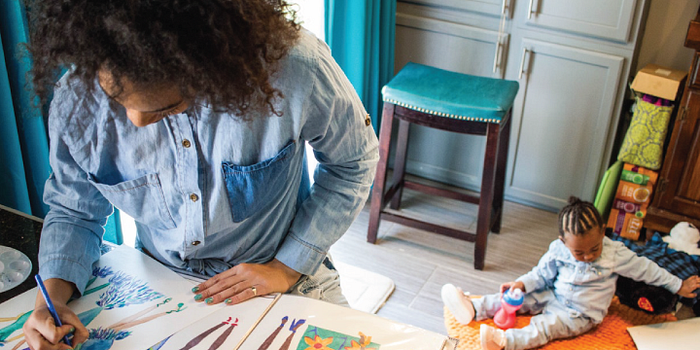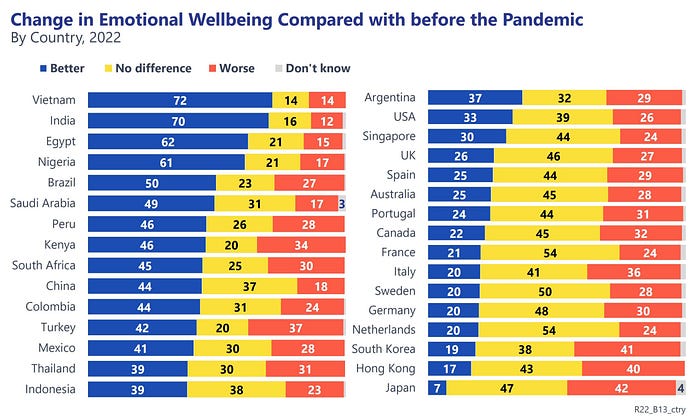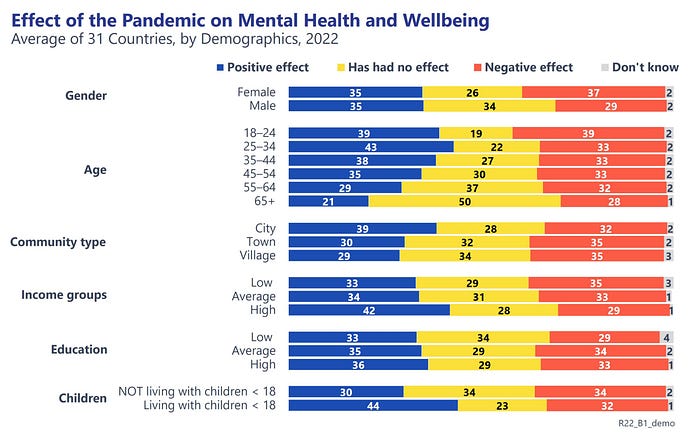Survey: Further Research Needed on Pandemic’s Effect on Mental Health
Younger People and Women More Likely to Report Negative Impact on Well-Being from COVID-19 Pandemic

New research conducted for BBC World Service “shows the pandemic has a profound effect on the mental health of many people,” according to the World Health Organization (WHO), and that “further research on mental health and COVID-19 among specific at-risk populations (younger people and women) is needed.”
The poll of 31 countries and territories was conducted by GlobeScan for the BBC in June and July 2022 as the pandemic had receded in many countries. In total, almost 30,000 people around the world were surveyed about the impact that the COVID-19 pandemic has had on their lives.
Overall, 36% of people surveyed in 31 countries and territories said they felt better emotionally now than they did before the pandemic, compared with 27% who said they felt worse.
Many said that spending more time with family, having a better connection to their community and to nature, and feeling clearer about their overall priorities all had a positive effect.

People in Vietnam, India, Egypt, and Nigeria were most likely to say they felt better while in Japan, South Korea, and Hong Kong they were most likely to say they felt worse.
Women experienced a stronger negative impact of the pandemic on their mental health in almost all countries surveyed.

Personal loss has touched many people’s lives in the past two years. Almost half surveyed say they have lost someone they know of personally (49%), while one-third claim to have lost a loved one during the pandemic (33%). Many of these losses were greatly impacted by the pandemic: 56% of those who lost a loved one say the event was “a great deal” influenced by the pandemic, while 47% of those who lost someone they know personally say the same.
The pandemic also greatly influenced other life events such as having a change of career (40% of those who experience this say it was influenced “a great deal” by the pandemic), getting a pet (40%), deciding to get married (38%), deciding to have a child (34%), or deciding to get divorced (33%).
A WHO spokesperson said: “The GlobeScan findings show that (the) pandemic had a profound effect on the mental health of many people. This effect was not uniform, but diverse and differed between population groups.” They also emphasize that further research on mental health and COVID-19 among specific at-risk populations is needed, and particularly on factors making certain subgroups of younger people and females more at risk for the detrimental effects of the COVID-19 pandemic.

Since outpatient mental health services have been particularly disrupted during the pandemic and only a minority of people with mental health problems received treatment, the COVID-19 pandemic has further widened the mental health treatment gap, the WHO spokesperson said. “Future studies should therefore focus on scaling up mental health services and psychosocial support as an fundamental component in preparedness and response plans for future public health emergencies.”
Andrew Oswald, professor of economics and behavioural science at the University of Warwick, said: “What we know is that there is a persistent kind of optimism-today bias. People look back and incorrectly tend to think that things were worse then and that they are happier now. This has been demonstrated in long-running longitudinal research by comparing recall levels of happiness with the actual levels of happiness when measured at the time.”
The full poll results can be downloaded on the GlobeScan website.
This article was originally posted by GlobeScan. B The Change gathers and shares the voices from within the movement of people using business as a force for good and the community of Certified B Corporations. The opinions expressed do not necessarily reflect those of the nonprofit B Lab.


